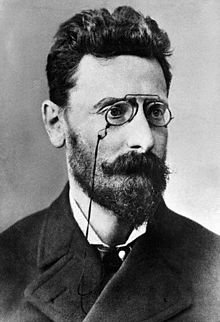Joseph Pulitzer
| Joseph Pulitzer | |
|---|---|
 |
|
| Member of the U.S. House of Representatives from New York's 9th district |
|
|
In office March 4, 1885 – April 10, 1886 |
|
| Preceded by | John Hardy |
| Succeeded by | Samuel Cox |
| Personal details | |
| Born |
József Pulitzer April 10, 1847 Makó, Kingdom of Hungary, Austrian Empire |
| Died | October 29, 1911 (aged 64) Charleston, South Carolina, United States |
| Political party | Democratic |
| Spouse(s) | Katherine "Kate" Davis (1878–1911; his death; 7 children) |
| Occupation | Publisher, philanthropist, journalist, lawyer |
| Religion | Judaism |
| Net worth | USD $30 million at the time of his death (approximately 1/1142nd of US GNP) |
| Signature | |
| Military service | |
| Allegiance | United States of America |
| Service/branch | Union Army |
| Years of service | 1864–1865 |
| Unit | First Regiment, New York Cavalry |
| Battles/wars | American Civil War |
Joseph Pulitzer (![]() i/ˈpʊlɪtsər/;Hungarian: [ˈpulit͡sɛr]; born József Pulitzer; April 10, 1847 – October 29, 1911) was a Hungarian-American newspaper publisher of the St. Louis Post Dispatch and the New York World. Pulitzer introduced the techniques of yellow journalism to the newspapers he acquired in the 1880s. He became a leading national figure in the Democratic Party and was elected congressman from New York. He crusaded against big business and corruption, and helped keep the Statue of Liberty in New York.
i/ˈpʊlɪtsər/;Hungarian: [ˈpulit͡sɛr]; born József Pulitzer; April 10, 1847 – October 29, 1911) was a Hungarian-American newspaper publisher of the St. Louis Post Dispatch and the New York World. Pulitzer introduced the techniques of yellow journalism to the newspapers he acquired in the 1880s. He became a leading national figure in the Democratic Party and was elected congressman from New York. He crusaded against big business and corruption, and helped keep the Statue of Liberty in New York.
In the 1890s the fierce competition between his World and William Randolph Hearst's New York Journal caused both to use yellow journalism for wider appeal; it opened the way to mass-circulation newspapers that depended on advertising revenue and appealed to readers with multiple forms of news, entertainment and advertising.
...
Wikipedia
